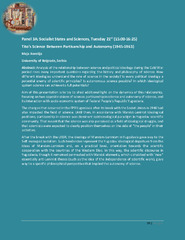Приказ основних података о документу
Tito’s Science Between Partisanship and Autonomy (1945-1963)
| dc.creator | Korolija, Maja | |
| dc.date.accessioned | 2023-11-26T16:03:58Z | |
| dc.date.available | 2023-11-26T16:03:58Z | |
| dc.date.issued | 2021 | |
| dc.identifier.uri | http://rimsi.imsi.bg.ac.rs/handle/123456789/2352 | |
| dc.description.abstract | Analysis of the relationship between science and political ideology during the Cold War period rises many important questions regarding the history and philosophy of science: How different ideologies understand the role of science in the society? Is every political ideology a potential enemy of scientific principles? Is autonomous science possible? In which ideological system science can achieve its full potentials? Aim of this presentation is to try to shed additional light on the dynamics of this relationship, focusing on two opposite visions of science: partisanship in science and autonomy of science, and its interaction with socio-economic system of Federal People's Republic Yugoslavia. The changes that occurred in the FPR Yugoslavia after its break with the Soviet Union in 1948 had also impacted the field of science. Until then, in accordance with Marxist-Leninist ideological positions, partisanship in science was dominant epistemological paradigm in Yugoslav scientific community. That meant that the science was also perceived as a field of ideological struggle, and that scientists were expected to clearly position themselves on the side of "the people" in their activities. After the break with the USSR, the ideology of Marxism-Leninism in Yugoslavia gave way to the Self-managed socialism. Such tendencies represent the Yugoslav ideological departure from the ideas of Marxism-Leninism and, on a practical level, orientation towards the scientific cooperation with the countries of the Western Bloc. In this way, the scientific discourse in Yugoslavia, though it remained permeated with Marxist elements, which cohabited with "new" essentially anti-Leninist theses (such as the idea of the independence of scientific work), gave way to a specific philosophical perspective that implied the autonomy of science. | sr |
| dc.language.iso | en | sr |
| dc.publisher | National Hellenistic Research Foundation | sr |
| dc.rights | openAccess | sr |
| dc.rights.uri | https://creativecommons.org/licenses/by/4.0/ | |
| dc.source | 2nd Early Career Scholars Conference, Science and its Enemies: Exploring Conflicts and Alliances in the History of Science | sr |
| dc.subject | Science | sr |
| dc.subject | FPRY | sr |
| dc.subject | USSR | sr |
| dc.subject | Partisanship | sr |
| dc.subject | Autonomy | sr |
| dc.title | Tito’s Science Between Partisanship and Autonomy (1945-1963) | sr |
| dc.type | conferenceObject | sr |
| dc.rights.license | BY | sr |
| dc.identifier.fulltext | http://rimsi.imsi.bg.ac.rs/bitstream/id/6106/bitstream_6106.pdf | |
| dc.identifier.rcub | https://hdl.handle.net/21.15107/rcub_rimsi_2352 | |
| dc.type.version | publishedVersion | sr |

